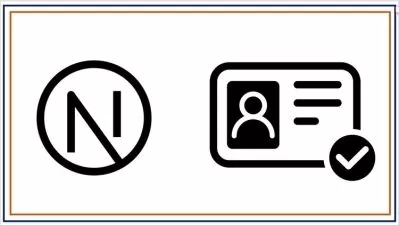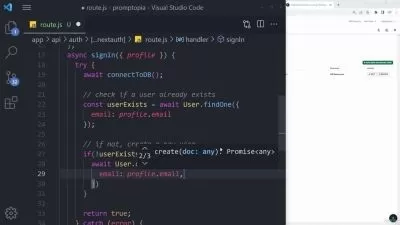Develop Secure Apps with NextJS14, Json Web Token & Cookies
Ranjan Pandey
2:14:55
Description
Learn to secure your NextJS Application with JWT Cookie based Authentication
What You'll Learn?
- You will learn about JWT and its working
- You will learn to create new next js 14.0 application
- You will learn how to setup Tailwind CSS NextJS14 and start with development
- You will learn about working of Next js app
- You will learn to implement JWT Cookie based Authentication
- You will learn to protect routes in NextJS app using JWT based tokens
Who is this for?
What You Need to Know?
More details
DescriptionIn this course you will learn how to secure your NextJS Application with JWT Cookie based Authentication.
Securing a Next.js application with JWT and cookies involves creating a server-side authentication endpoint to handle user logins. Upon successful authentication, the server generates a JSON Web Token (JWT) signed with a secret key. This JWT is then sent to the client as an HTTP-only cookie, enhancing security by preventing JavaScript access.
On the client side, implement functions for user authentication, including login, logout, and status checking. For authenticated requests, include the JWT in the request headers to verify the user's identity on the server.
In summary, the process entails validating user credentials on the server, generating a signed JWT, and securely transmitting it to the client via an HTTP-only cookie. The client-side implementation manages user authentication functions, and the server verifies requests using the received JWT. This approach enhances application security by utilizing the capabilities of JWTs and secure cookie handling.
JSON Web Tokens (JWT) are a compact, URL-safe means of representing claims between two parties. In web development, JWTs serve as secure tokens for transmitting information, often used for user authentication. Comprising three parts—header, payload, and signature—JWTs are encoded and signed, providing a lightweight and tamper-evident structure. Their versatility and self-contained nature make JWTs widely adopted for transmitting authenticated data, and they are commonly employed in various web-related protocols and frameworks.
Who this course is for:
- Anyone who wants to secure fullstack applications with JWT Cookie based authentication
In this course you will learn how to secure your NextJS Application with JWT Cookie based Authentication.
Securing a Next.js application with JWT and cookies involves creating a server-side authentication endpoint to handle user logins. Upon successful authentication, the server generates a JSON Web Token (JWT) signed with a secret key. This JWT is then sent to the client as an HTTP-only cookie, enhancing security by preventing JavaScript access.
On the client side, implement functions for user authentication, including login, logout, and status checking. For authenticated requests, include the JWT in the request headers to verify the user's identity on the server.
In summary, the process entails validating user credentials on the server, generating a signed JWT, and securely transmitting it to the client via an HTTP-only cookie. The client-side implementation manages user authentication functions, and the server verifies requests using the received JWT. This approach enhances application security by utilizing the capabilities of JWTs and secure cookie handling.
JSON Web Tokens (JWT) are a compact, URL-safe means of representing claims between two parties. In web development, JWTs serve as secure tokens for transmitting information, often used for user authentication. Comprising three parts—header, payload, and signature—JWTs are encoded and signed, providing a lightweight and tamper-evident structure. Their versatility and self-contained nature make JWTs widely adopted for transmitting authenticated data, and they are commonly employed in various web-related protocols and frameworks.
Who this course is for:
- Anyone who wants to secure fullstack applications with JWT Cookie based authentication
User Reviews
Rating
Ranjan Pandey
Instructor's Courses
Udemy
View courses Udemy- language english
- Training sessions 25
- duration 2:14:55
- Release Date 2024/04/13














